Hi,
What are you grateful for? What are you taking for granted right now?
As Thanksgiving and the end of the year approaches, it’s a great time to reflect.
Understanding what you’re grateful for can be a great exercise, and mood enhancer; studies show writing down 3 things you’re grateful for daily can make you happier.
And equally important, it can help to ask, “What am I taking for granted right now?”
While a near-death experience can often cause this kind of reflection, you don’t need tragedy to pause and reflect. You can do it any time by pausing and looking around.
You may be surprised by the things you realize are well worth gratitude: you and your family’s health, a job you enjoy, coworkers that are fun to work with, living in a place you like, or even just that you wake up in the morning with little or no pain.
—
In today’s edition, we take a look at new data about a pandemic-era problem, review a report on workforce trends, have a quick survey we’d love your help on, and take a look at one of my favorite phrases I use as a manager.
Let’s dive in…
Table of contents:
- 🥘 Food for Thought on Ghost Engineers and Quiet Quitters
- 📰 News & Reports for Managers on 2024 Workforce Trends
- 🗣️ Tell us what you want our Black Friday Deal to be & Win!
- 📖 Your Leadership Long Read on 3 Simple Words to be a Better Manager
- ❓ Poll of the Week on Burnout and How You Use AI
➡️ Did a friend forward this to you? Get every issue straight to your inbox by signing up here.
Note: This is a preview of our weekly leadership newsletter, Lighthouse Leadership Weekly (LLW).
To get this sent to your inbox every week, along with our latest long form essays on this blog, you can sign up here.

🥘 Food for Thought
Have you heard of the trend of engineers getting multiple jobs and doing little or nothing for all of them?
During the pandemic I saw a rise in this, and even met a few people who did it here in Austin, Texas.
Ignoring the ethics of it for a moment (which I find deeply unethical to do), it was fascinating to hear all the things they did to make it work:
- Become professionals at making excuses.
- Skipping meetings, claiming conflicts, or needing time to focus.
- When required, joining with no camera and not really listening at all.
Some even went so far as to research the PIP process at companies to know exactly how long they could skirt by before they’d likely get fired.
An artifact of the past?
I hadn’t heard this talked about much lately, so I assumed that the multiple rounds of layoffs we’ve seen in recent years may have purged these grifters from the ranks.
Yet, it seems they live on as a new Stanford study shows a shocking rate of unproductive engineers:
And before you blame this all on remote work (which it does occur at a 50-130% higher rate), realize that it actually happens across work location types:
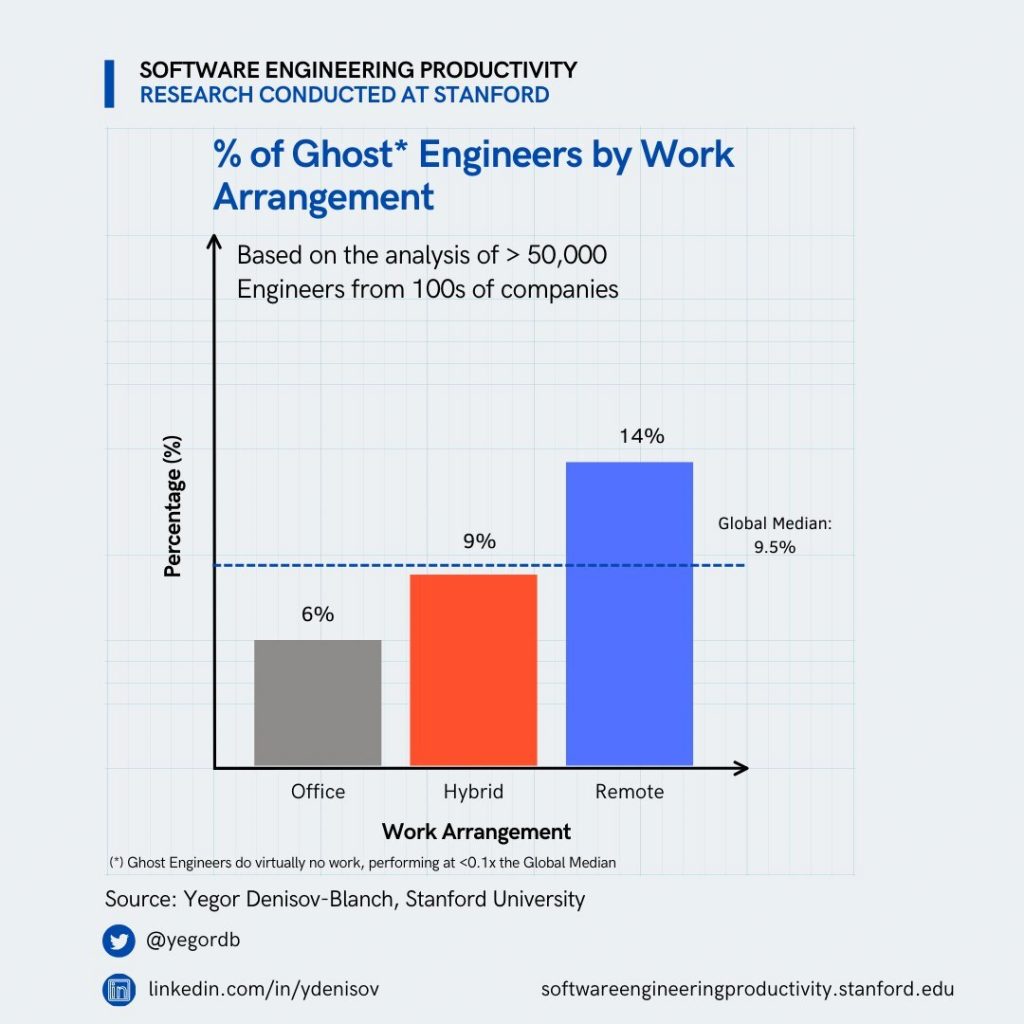
What do you do if you think you have a ghost engineer?
This can be a tough question. Suspecting someone isn’t doing much work, and proving it can be two very different things. The same is true for thinking someone may have multiple jobs, but not having an easy way to know.
So what can you do? A few things can help:
- Talk to your manager / boss immediately: When you have an underperformer, it’s helpful to get perspective from your manager. You can then review your plan for dealing with them for feedback, and also find out what the process is at your company for separation (if it comes to that).
- Make your list for layoffs: The economy appears to be in a stronger position right now, but you never know what could strike your company, industry, or the market in general. Having your list of who you’d cut and who you’d fight tooth and nail to keep is helpful to have before you get the dreaded request from your boss (and have very little time to think then).
- Make their tactics difficult: Much of their success in doing nothing comes from hiding, so make that difficult by doing things like:
- Requiring their camera to be on for most calls
- Specifically, call on them in meetings to get their input
- Ask them to pair with others on your team
- Make them commit to specific deadlines you hold them to
- Track their progress by setting intermediate goals, instead of one, big task they seem to take forever to complete and give vague updates on.
- Document everything: When you go to HR to try to solve this, the first thing they’ll ask you for is evidence. That means you need to document issues over time:
- Every time you talk about the issue in their 1 on 1s, note it.
- Send emails and chat messages with specific takeaways and agreements. (1+2 are central to our battle-tested employee turn around process)
- Make note of when they check out of, no-show, or are unprepared in meetings.
- Keep track of when team members raise issues about them (When? Where? What were the issues?)
- Protect your team: If you feel like all they’re doing is wasting you and your team’s time and it’s hurting morale and productivity for everyone else, then you need to shift some of your tactics towards supporting the rest of your team:
- Use praise to call out work well done, so good people know you value their efforts.
- Reward your hard-working team members with the best projects and tasks. Give them more autonomy around their work as a reward, too.
- Isolate the ghost’s work, so they do not block other team members who get things done.
- Call them on their BS. This may seem scary, but at some point it helps as a leader to say what everyone else is thinking. When you do, stick to the facts, and don’t make it personal, but make it clear when you know the rest of your team sees it, too.
While a lot of the work we do as leaders can be inspiring and motivating, this is one of those ugly chores you have to do sometimes.
If you handle it well, and you’re able to remove a ghost from your team, you’ll often find your team will respect you more; A players HATE working with low performers and grifters, so they in particular will LOVE you did something about it.
I saw this firsthand early in my career…
When playing with your dog goes wrong.
I saw this sort of ghost behavior play out at a prior job well over a decade ago.
We were a small team and a scrappy startup and yet there was a team member who was constantly late to meetings, underdelivered on their work, and often was a blocker for the rest of the engineering team.
This person was very likeable as a human, and always seemed to have an excuse for any issues they faced.
Yet, we had a hard time making the case to get rid of him, because he was good friends with one of the founders.
It wasn’t until finally one day they posted a video on Facebook of them playing with their dog at 2 pm on a Wednesday, that it finally broke for them. Because they were friends with others in the company, they saw this post after work and were irate.
The hidden costs of a ghost
Not only did getting rid of them and their salary help lengthen the burn rate at the company, but we experienced a variety of benefits no one had planned for:
- Our head of engineering suddenly had time for other projects like a long-needed architecture and scaling plan, because he was no longer micro-managing the ghost.
- With the blocker removed, the engineering team shipped more projects faster despite having 1 less engineer.
- Morale was lifted company-wide, because the new velocity meant more features that sales could sell on, and we started pulling ahead of a key competitor again.
No one realized in the moment how much time, energy, and resources the ghost was burning. It was only after that it became apparent we should have made that call much sooner.
Have you ever had a ghost on your team? How did you deal with them?
Hit reply and let me know your story and lessons learned, too.
📰 News & Reports for Managers
The 2024 Workforce Trends Report
I’m always interested in workforce trends, because they give us a hint at what we may be seeing anecdotally, but don’t know if it’s just us, or a larger pattern.
That’s why I was interested in the results of the Leapsome Work Force Trends report.
Now, like any report by a company that wants to sell you their software, you have to take it with a grain of salt. That’s why I skip out on the sections that then are results that speak to their product and offering.
The main thing I look for then is to make sure they have enough respondents, and some of the questions are genuinely interesting beyond a “help them sell their product” perspective.
And this report comes from a survey of “over 2,500 full-time professionals from across the globe”, so just enough to be interesting.
Let’s look at 3 takeaways that caught my eye:
1) Meeting Waste continues to be a big problem
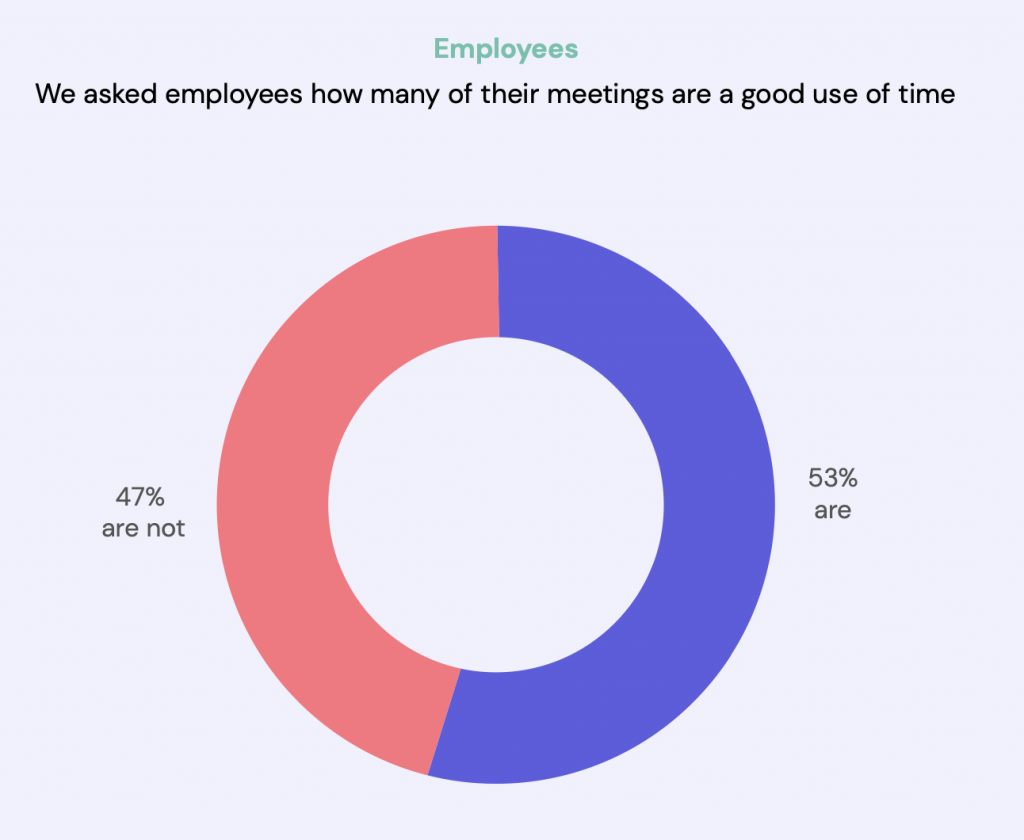
As it turns out, half of meetings are considered a waste of time, with the culprit often being agendas; they reported that 1 in 3 meetings lack an agenda.
You would think something as simple as having an agenda would be an easy requirement for meetings, yet here we are.
If you want to make your team stand out, all you have to do is make all your meetings have an agenda, and cancel the ones that don’t. You may (but shouldn’t) be surprised how having a plan for each meeting can increase the quality of them.
Regardless, it seems most workplaces have a long way to go when it comes to making meetings consistently valuable.
2) HR significantly overestimates employee engagement
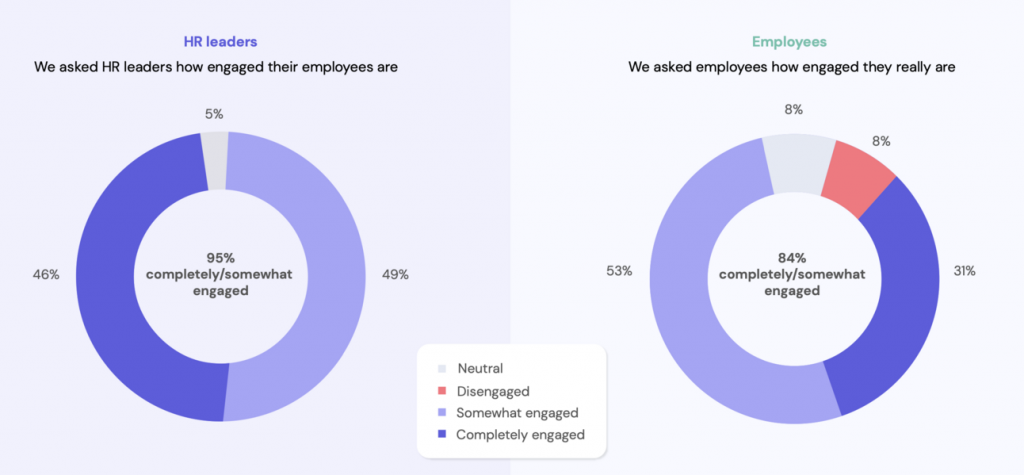
Similar to last week’s data, we again see HR overestimates how employees feel about working at their company.
However, this one may be unfairly set up to guarantee a poor result. Here’s why:
- If I ask you “How engaged are all 1,000 of your employees?”
- Then, I go ask all 1,000 of your employees about their individual engagement
Of course, the results will be different. You had to speak for an average of 1,000 people, while surveying each employee gives real granularity.
So while I think it’s likely most HR leaders (and managers in general) overestimate how engaged their team really is, I don’t think the question was really fair to them.
Remember: No survey will tell you as much as actually observing and talking directly to your team members.
Body language, their tone of voice, and what they tell you when they know you truly care what they have to say, all will show you a lot more about what your team really thinks. If you don’t know how to get started on doing that, then start by asking 1 or 2 of these questions every week in your 1 on 1s until you feel the connection with your team.
3) Employees overestimate their performance, too.
Now, to be fair, we look at a case of the rank and file employees also getting things wrong.
According to the survey, employees also overestimate sometimes, with 80% of employees thinking they’re a top performer…
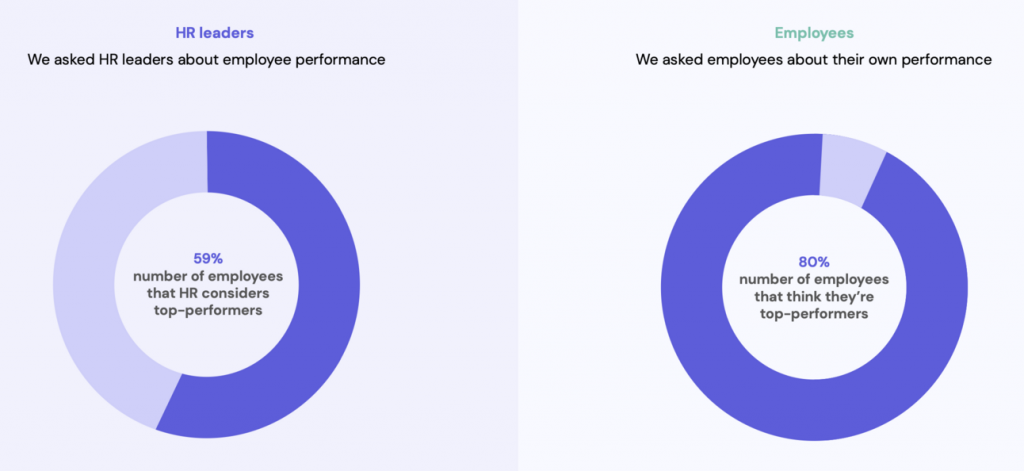
There’s actually a name for this: The Illusory Effect
Most people overestimate their abilities and how they stack up against their peers.
Remember this next time you have to make a tough choice for a promotion, or writing your performance reviews for your team. Chances are, most people think they’re doing better than you think.
And this ties in well then with the final interesting insight from this report:
“3 in 4 workers want more feedback and recognition from their manager (73% to be exact)”
If you want your team to know where they stand, so they don’t have illusions about how great they are, it’s on you to deliver more feedback to them.
When you provide enough feedback and praise, your team will not be surprised by what’s in their performance review. They’re also much less likely to have a severely over-inflated view of how they’re doing.
🗣️ Tell us what you want our Black Friday deal to be & win!
Next week is the American holiday of Thanksgiving, which means that we also have the big sale days of Black Friday and Cyber Monday.
In honor of this, we’ll be having a Black Friday through Cyber Monday deal on Lighthouse Lessons courses. You buy them now, and then take them in 2025 after the holidays are over.
To help shape our offer, we’d appreciate your input on what courses to offer.
Please take 1 minute and complete our survey here: https://forms.gle/chWgZwj4zi7DjCr77
Bonus! One lucky respondent will be randomly selected to win a free leadership book of their choosing, but you can only win if you take our survey here.
📖 Your Leadership Long Read on 3 Simple Words to be a Better Manager
What keywords and phrases are part of your leadership philosophy? What do you teach your team is really important to you?
This week, we take a look back at one of my favorite phrases, and how I teach my team what that really means.
When you have phrases like this, it can be a great shortcut to coaching your team to work better with you. They’ll remember the phrase, and if you’ve taught them well, a whole cascade of other ideas and actions will then happen with it.
Yet, having key phrases only works if you do your part, too.
Not only do you have to teach them the phrase or concept, but you also have to do your part to set them up for success.
This will all make more sense with an example, which is exactly what this week’s post is all about.
Read: How teach your team to better manage your expectations in 3 simple steps.
❓ Poll of the Week
Last week, we asked an important question about helping your team stay at their best:
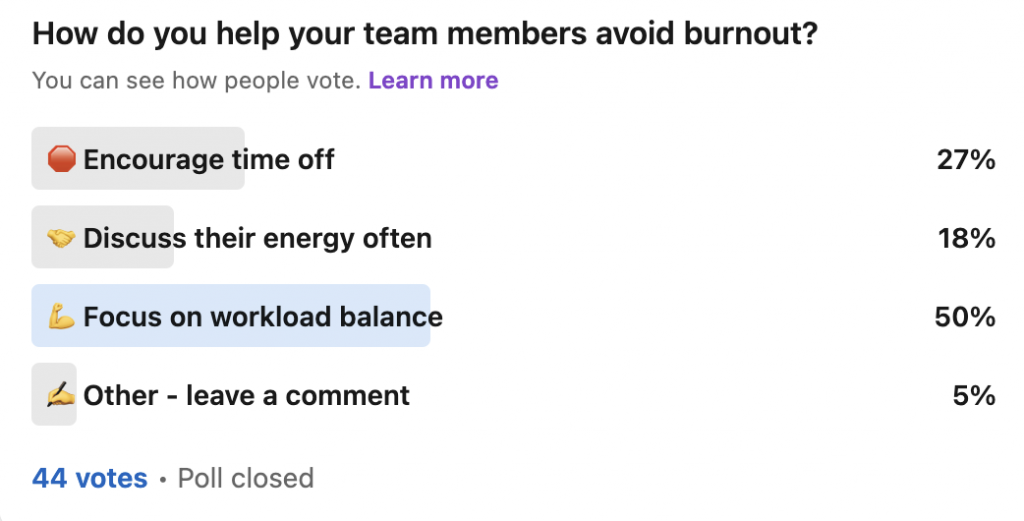
When you help them avoid burnout, you’re not just doing them a favor, you’re ensuring your team doesn’t lose a good team member.
Because when people burn out, at best, they become a lot less effective and need a lengthy vacation to recover, or at worst they leave your team and you lose a great employee.
Bonus: One of the reasons I love Linkedin polls is that people can comment and share more insights, too.
And in last week’s poll, we got some great added thoughts from readers like you about gauging energy levels, how you should treat your team, and more. You can read those comments, and add your own thoughts here.
—
Now, this week we take a look at the impact AI is having for you and other leaders:
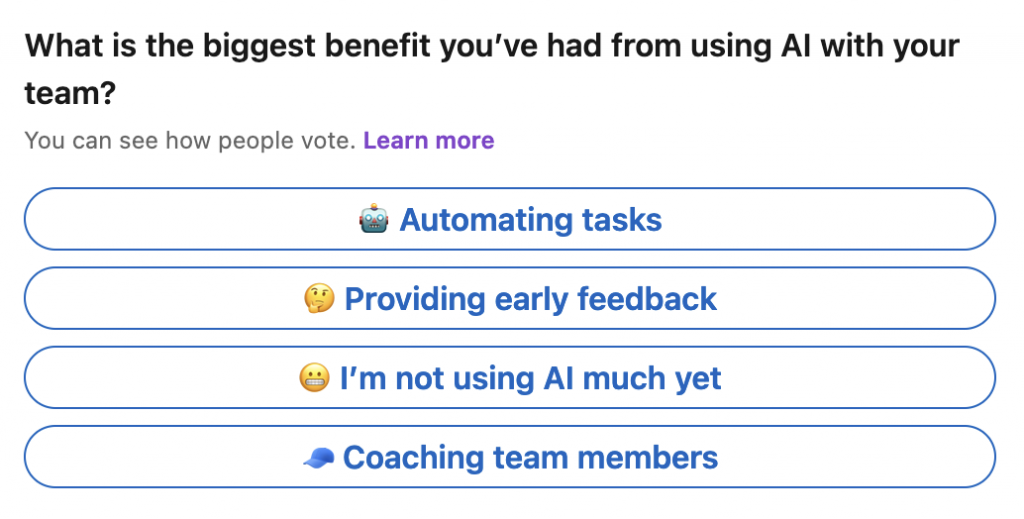
Tell us how you’re using AI by taking our Linkedin poll here.
Sign up to get this newsletter & our latest blog posts straight to your inbox:




